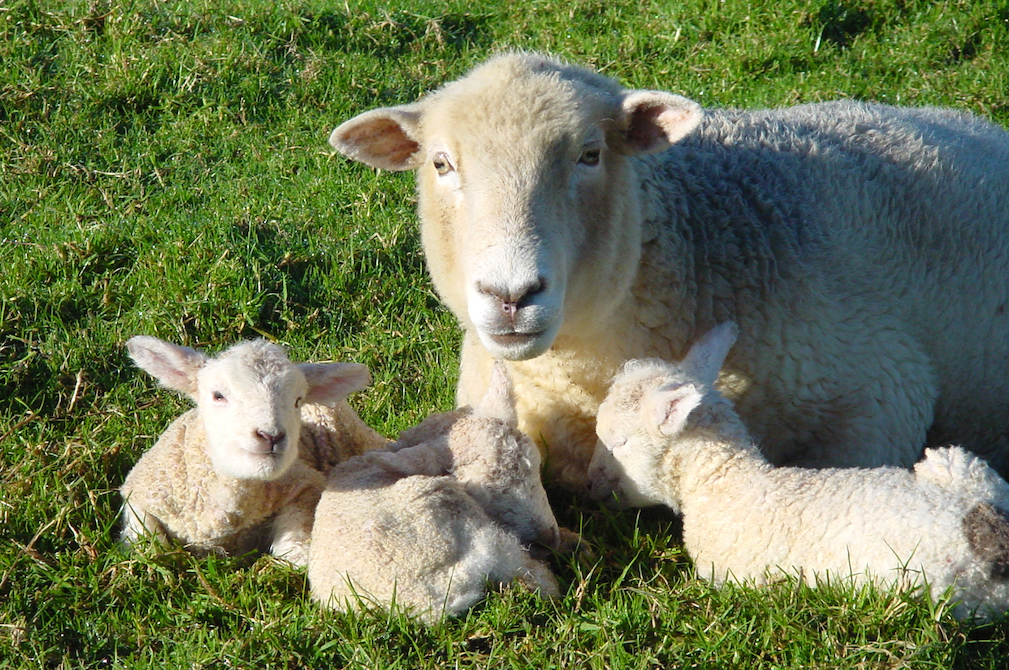
In the Southern Hemisphere, Advent comes along with spring: These are neighbors to Sr. Susan Elizabeth Smith, a Sister of Our Lady of the Missions, in New Zealand -- lambs and a ewe, "sure signs of spring!" (Provided photo)

(GSR logo/Toni-Ann Ortiz)
This issue of The Life features 10 sisters preparing readers for Advent and Christmas. From east and west, north and south, the sisters responded to this request:
Write a personal reflection or prayer on Advent or Christmas.
______
Donna L. Ciangio is a Sister of St. Dominic of Caldwell, New Jersey. With an academic background in fine arts, religious studies, education and ministry, she has been the director (U.S. and international) of Renew International and the director of pastoral services for the National Pastoral Life Center. She has worked extensively in church leadership consultation. Most recently, she has been a university adjunct professor and the chancellor of the Archdiocese of Newark. She speaks, writes and publishes extensively.
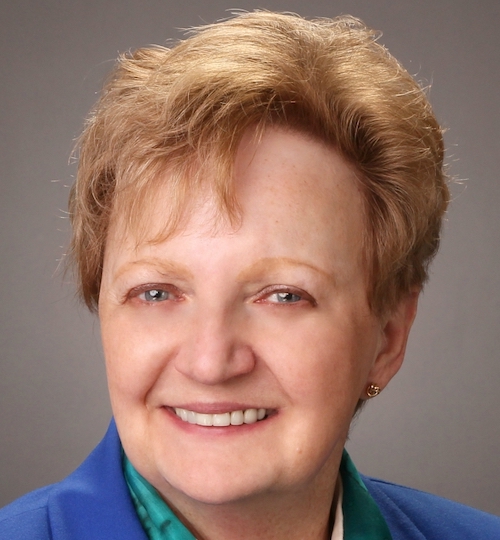 Advent is my favorite liturgical season. In the northern hemisphere, the light is different; a sort of low-light in between darkness and dawn. I can hear the longing of the prophets for the Messiah down through the centuries. O come, O come, Emmanuel!
Advent is my favorite liturgical season. In the northern hemisphere, the light is different; a sort of low-light in between darkness and dawn. I can hear the longing of the prophets for the Messiah down through the centuries. O come, O come, Emmanuel!
Isaiah, in particular, calls us to be watchful, to be alert, to go up to the high mountain where we can be one with God, waiting in anticipation.
But Advent is also a procession to the stable. It is about how we welcome Christ into our hearts and how we become Christ to others each day as we do our usual things. We focus our attention on the three comings of Christ: the past — we celebrate his birth in Bethlehem; the present — in the community that is gathered for the Eucharist; and on the future — his second coming.
Advent calls us to be joyful and attentive to God and each other. We are called to take time to be kind, to lend support and affirmation, to take time for others, be present, and especially to help those in need.
Advent is about renewal. It begins the new year, a time of joy and hope!
Reflection: What will you do to "go up to the high mountain" and keep Advent as a special time of being one with God?
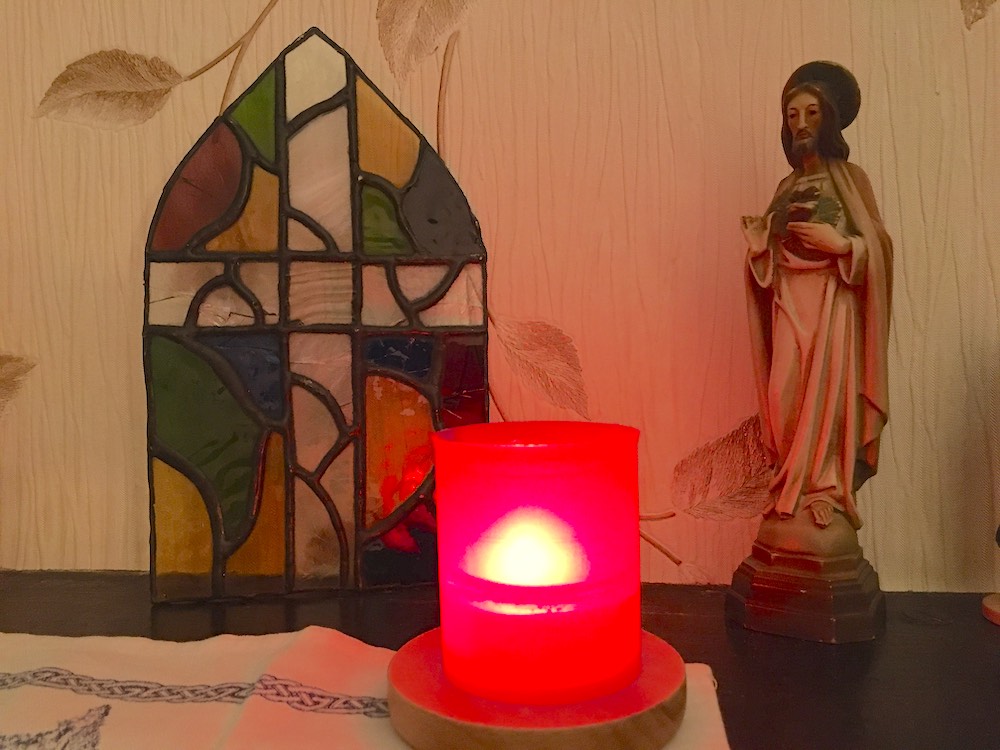
Apostle of the Sacred Heart of Jesus Sr. Kathryn Press' personal prayer table for Advent reminds her that "we wait in darkness for Christ, our light. But we are not alone. We wait with Mary, with Joseph, and with members of the body of Christ near and far from us." (Provided photo)
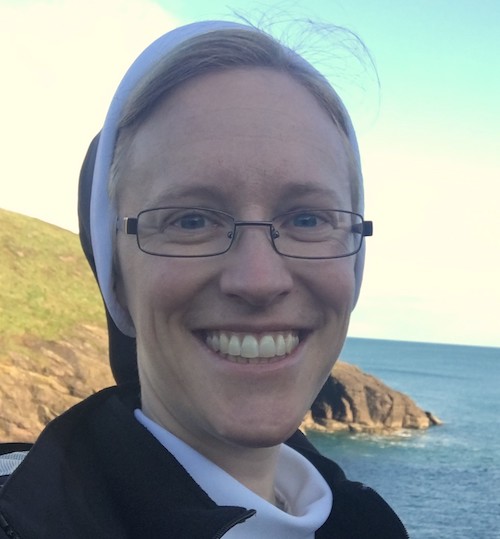 Kathryn Press is an Apostle of the Sacred Heart of Jesus from the U.S. state of Georgia. She professed her final vows in 2018. With a master's of divinity degree and a background in religious studies, she has taught every grade from pre-K through high school. After opening a convent in Ireland, she taught in New York City for three years before returning to Ireland in September 2020 to work in evangelization and parish ministry.
Kathryn Press is an Apostle of the Sacred Heart of Jesus from the U.S. state of Georgia. She professed her final vows in 2018. With a master's of divinity degree and a background in religious studies, she has taught every grade from pre-K through high school. After opening a convent in Ireland, she taught in New York City for three years before returning to Ireland in September 2020 to work in evangelization and parish ministry.
I caught up with a friend on the phone recently. Because of time zone difference, it was her night and my morning. In the course of the conversation, we marveled at how the seasons have changed. We're both living in dramatically different climates. In Alaska, she's already had snow and freezing temperatures, while I'm enjoying the benefits of the Gulf Stream flowing past Ireland. But what we have in common is the marked increase in darkness. You can feel the light slipping away as the days grow shorter and shorter. A busy day of work might mean missing being out in the sunshine altogether.
When the call ended, my heart was full of gratitude and hope. I am not alone. Someone else is with me in this night. It's comforting to think that the presence of a friend thousands of miles away could dispel my fears and help me to embrace the blessings of night.
John Michael Talbot's hymn "Holy Darkness" puts the words of a John of the Cross poem to music, beginning with the verse:
Holy darkness, blessed night
Heaven's answer hidden from our sight
As we await you, O God of silence
We embrace your holy night.
While describing the dark night of the soul, this is also the perfect Advent hymn. Regardless of where you live at this moment — whether it's your winter or summer, or you hardly notice a change in the seasons — Advent slows us down. We wait in darkness for Christ, our light. But we are not alone. We wait with Mary, with Joseph, and with members of the body of Christ near and far from us.
I pray that you can embrace the darkness and find the hope and peace of this blessed night. Let us enter into, embrace, accept and even look forward to this time of holy darkness.
Advertisement
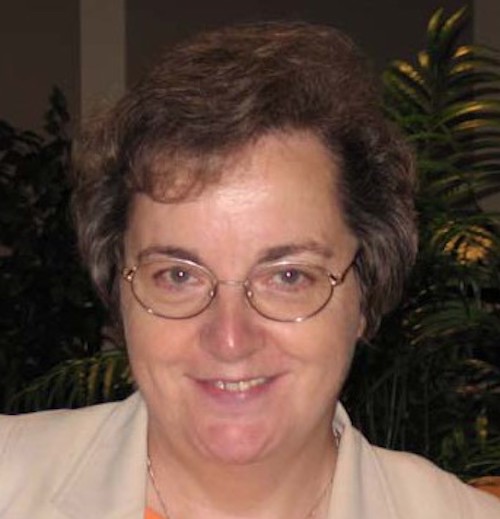 Deirdre Mullan is a Sister of Mercy from Ireland. At the height of unrest in Northern Ireland, Mullan spent 25 years as a teacher and administrator in schools. With a doctoral degree in the feminization of poverty, she has long been active in promoting the education of girls. She served as the executive director of Mercy Global Concern at the United Nations for more than 10 years, later directing the Partnership for Global Justice, a network of over 125 small congregations at the U.N. Her present ministry is with UNICEF, the United Nations Children's Fund, seeking ways to partner with religious communities.
Deirdre Mullan is a Sister of Mercy from Ireland. At the height of unrest in Northern Ireland, Mullan spent 25 years as a teacher and administrator in schools. With a doctoral degree in the feminization of poverty, she has long been active in promoting the education of girls. She served as the executive director of Mercy Global Concern at the United Nations for more than 10 years, later directing the Partnership for Global Justice, a network of over 125 small congregations at the U.N. Her present ministry is with UNICEF, the United Nations Children's Fund, seeking ways to partner with religious communities.
Advent is a magical time of darkness with its promise of light. In the northern hemisphere, the days are short and the nights long.
It was during Advent several years ago that I joined the Pennsylvania Prison Society and met Tim, a troubled young man in solitary confinement. Our first meeting, in a glass-paneled room with an armed guard, was both stilted and awkward.
Over many visits, trust began to grow, and while I had no idea why Tim was incarcerated, we began our long journey of friendship. He shared details about his early life, his failed marriage and the deep pain he carried because his crime had broken his mother. More than anything, he yearned for a Christmas card from her to display in his prison cell. I asked how long it had been since they last spoke.
"Three long, lonely years," he said.

Mercy Sr. Deirdre Mullan has seen the face of God in prisoners. (Pexels/Xiaoyi)
I agreed to call his mother. She was intrigued by my Irish accent and asked why I was bothering with her errant son. Peg was a broken woman, shamed by her son's vicious murder of an innocent man. However, she sent the card.
This first step toward healing was buoyed and inspired by Pope Francis' words that "the future does have a name, and its name is hope."
Over the course of many visits, I noted a change in Tim, and at the end of one visit, the warden asked to speak with me. Tim had become a model prisoner, and he believed the change could be attributed to my visits.
Tim will serve out another seven years for his crime, one he now readily agrees was a terrible act. He has finished his General Certificate of Education, is reconciled with his family and looks forward to the cards his mum sends regularly.
In this Advent season, I say thank you to Tim, in whom I saw the face of God.
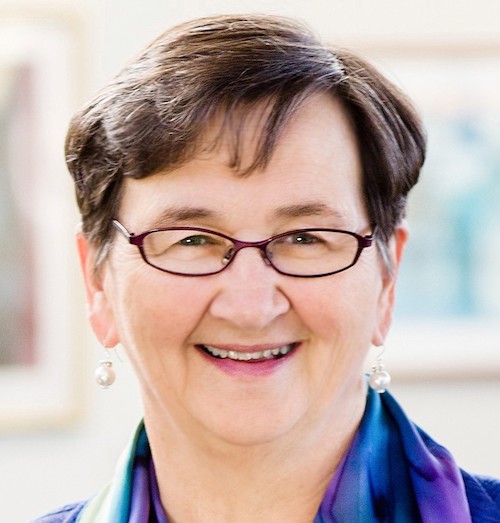 Andrea J. Lee is a Sister, Servant of the Immaculate Heart of Mary from Wisconsin. Her academic background is in music, languages, education and educational administration. She taught elementary school in Bonn, Germany, and Chicago before moving into university program administration. After administrative positions at Marygrove College in Detroit, Michigan, she served as president of St. Catherine University in St. Paul, Minnesota, and finally as president of Alverno College in Milwaukee. Beside serving on academic, community and civic boards and task forces, she continues to write and produce in the arts.
Andrea J. Lee is a Sister, Servant of the Immaculate Heart of Mary from Wisconsin. Her academic background is in music, languages, education and educational administration. She taught elementary school in Bonn, Germany, and Chicago before moving into university program administration. After administrative positions at Marygrove College in Detroit, Michigan, she served as president of St. Catherine University in St. Paul, Minnesota, and finally as president of Alverno College in Milwaukee. Beside serving on academic, community and civic boards and task forces, she continues to write and produce in the arts.
I am aware of Your Presence;
within deep and sonorous sounds you support and ground me.
Your familiar steps move with rhythm and grace across the daily patterns of my life;
steps that reassure; bring comfort; offer challenge and delight.
In the middle of this darkness, my eyes are open to You.
The silence grows heavy with longing.
I sometimes fear silence as emptiness,
but it is where You make your home and wait for me.
My prayer is engraved on my bones; etched in my memory;
as familiar to me as my name.
I repeat it like a child's rhyme;
spin it easily into song and graceful motion.
All of it — humble, shy and full of praise.
There is other prayer;
prayer I cannot breathe aloud —
for mercy; for healing; for grace.
Prayer that wanders across the beats of my heart,
weaving shy stories in the spaces between my words.
I have been looking for You and — I see now — You for me.
So I'll step from the shadows into your light;
dare to sit in your presence
and there receive blessing after blessing as You
breathe strength. Into me.
I have known such sweet souls on this journey;
trusted and good, each bearing your image.
When I cannot summon them on my own, they arrive quickly — as gift, as remedy, as grace.
Kin of my soul — at ease with my deepest grace; tolerant of my most strident weakness.
Will You stir up courage in me, uncloud my vision?
Inscribe your word on my soul as handbook for my life?
Sweep away all that clutters my path to You?
Wrap me in the cloak of your mercy,
and from your vast, deep well, let me draw strength?
Deep longing has brought me to this place.
Thank You for finding me here.
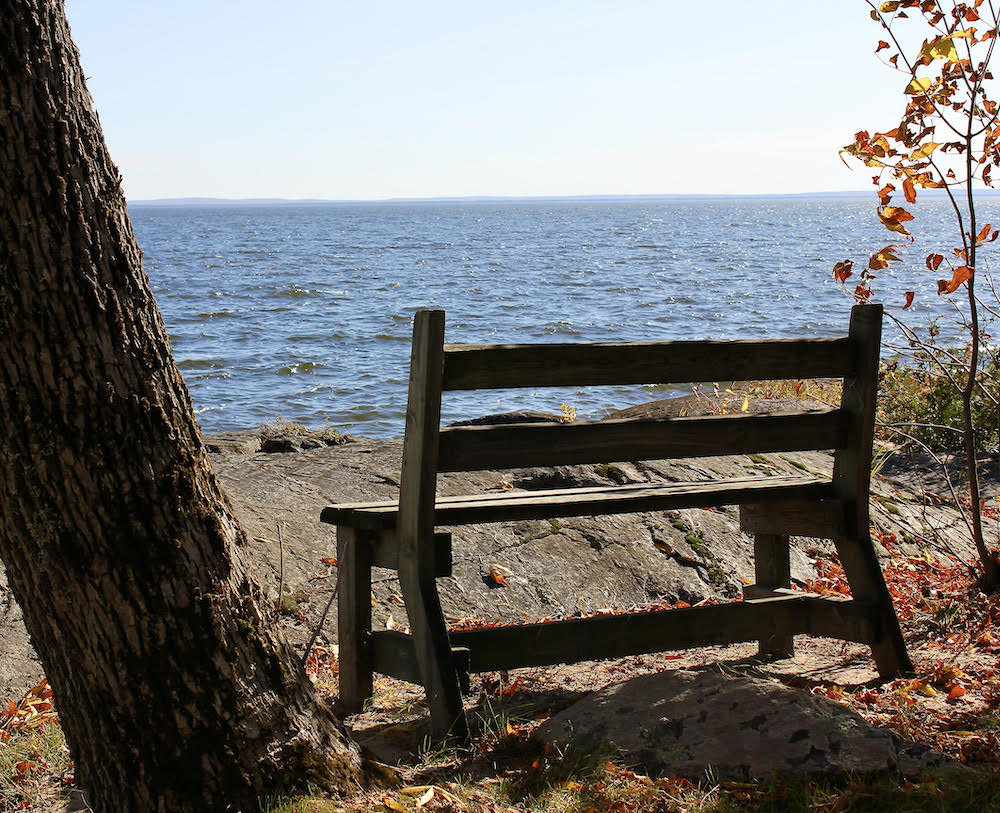
Pause ... Listen ... Be... (Provided photo)
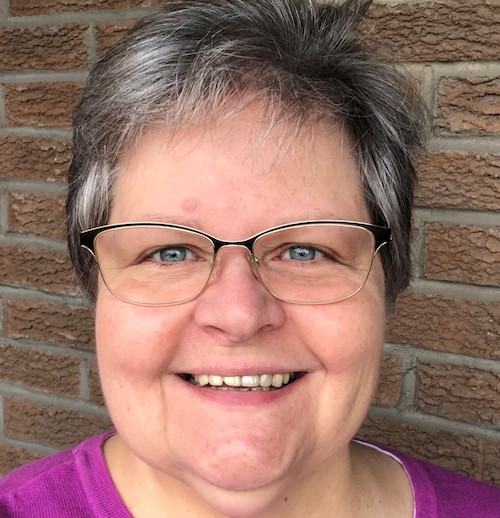 Stephanie Romiti is a Sister of St. Joseph of Sault Ste. Marie, Ontario, Canada. Her academic training was in education, and she spent more than 30 years in Catholic education in the United States and Canada as teacher, principal, religious educator and in faith formation. Since obtaining a graduate degree in Christian spirituality with certification in spiritual direction and directed retreats, she has served as retreat and spiritual director both in person and via digital platforms. Stephanie enjoys nature photography, music and creative arts, and often incorporates these in ministry.
Stephanie Romiti is a Sister of St. Joseph of Sault Ste. Marie, Ontario, Canada. Her academic training was in education, and she spent more than 30 years in Catholic education in the United States and Canada as teacher, principal, religious educator and in faith formation. Since obtaining a graduate degree in Christian spirituality with certification in spiritual direction and directed retreats, she has served as retreat and spiritual director both in person and via digital platforms. Stephanie enjoys nature photography, music and creative arts, and often incorporates these in ministry.
I am currently journeying with a few close friends who are each caring for a dying spouse. They have been engaged in a lot of "doing" for their life partners and dear friends, yet each has expressed in her own way how important "being" has become: spending quality time with their loved ones and family members and putting aside unnecessary tasks. Accompanying them, even from a distance, and living during this time of pandemic have been important reminders to me to appreciate each day as gift, the only present that I have. In living these experiences, I have been drawn into prayer and meditation, and I share some thoughts with you.
What have been the invitations I have experienced in recent months that continue to be offered during this Advent season?
A – Attention: to notice the Divine in all humanity, creation, and within
D – Deepen: to embrace solitude in order to listen
V – Value: to re-evaluate what is truly important and in need of my time and energy
E – Engage: to reach out to others even beyond physical boundaries and necessary distancing
N – Now: to live in this moment, recognizing that now is all I have
T – Thanksgiving: to be grateful for all
2 – 2 qualities: to be open to receive, and to be generous in giving of self
0 – 0 fear: to trust that God is here
2 – 2 responses: to embrace what is life-giving and to let go of what is not
0 – 0 regrets: to appreciate that life is too short to cling to the past
I pray these words inspire reflection and recognition of where God is leading each of us now: personally, communally and globally. Blessings during this Advent 2020!
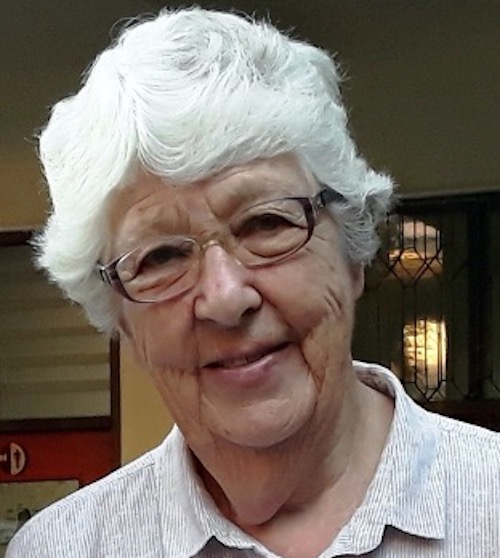 Susan Elizabeth Smith, a Sister of Our Lady of the Missions, has worked in education at various levels: primary and secondary school teaching in New Zealand, university education in New Zealand and Australia, and with Duquesne University in Rome and Manila, Philippines. She has been involved in pastoral and catechetical formation in Papua New Guinea; in adult literacy and numeracy programs for Maori in New Zealand; in congregational formation programs in Davao City, Philippines, and St. Rambert, France. Currently, she volunteers as a budget adviser, helps with an emergency housing trust and some environmental groups, and writes for publications.
Susan Elizabeth Smith, a Sister of Our Lady of the Missions, has worked in education at various levels: primary and secondary school teaching in New Zealand, university education in New Zealand and Australia, and with Duquesne University in Rome and Manila, Philippines. She has been involved in pastoral and catechetical formation in Papua New Guinea; in adult literacy and numeracy programs for Maori in New Zealand; in congregational formation programs in Davao City, Philippines, and St. Rambert, France. Currently, she volunteers as a budget adviser, helps with an emergency housing trust and some environmental groups, and writes for publications.
Advent is the promise of new life. Here in New Zealand, we are rushing through the last days of spring, and signs of new life abound. I am particularly fascinated by bird families I view from our home every day: pukeko (a type of swamp hen), pheasants and California quails.
There are many others, but what these have in common is that they nest on the ground. So, in order to avoid predatory hawks in the skies above and rapacious stoats and rats on the ground, the chicks have to be up and about within a day of hatching.
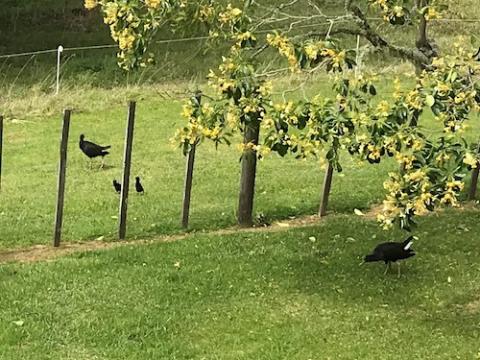
Two parent pukeko (the Maori name), or Australasian swamp hens, and their two chicks forage for food. (Provided photo)
I am overwhelmed by the watchfulness of the parents: The quail who sits on the fence post and warns his extended family if danger lurks, the pukeko parents who shepherd the little chicks inside a circle most of the time. I can almost forgive them for stripping our veggie garden and fruit trees in their effort to ensure good nutrition for their young. Like Mary and Joseph, they protect their young from their own King Herods.
I watch them and am reminded of Job's advice, "ask the beasts and they will teach you" (Job 12:7). There is much we can learn from the birds. As I read or watch media reports, I am constantly reminded of the immense physical and emotional harm so many children today experience. Psalm 8 teaches that humankind has stewardship over sheep, oxen, beasts of the field, birds of the air and fish of the sea (Psalms 8:6-9).
All too often, we abuse that calling to exercise stewardship over the rest of creation. An attitude of humble watchfulness toward those who are vulnerable in our societies, especially the young and innocent, would be a wonderful way of celebrating new life this Advent and Christmas.
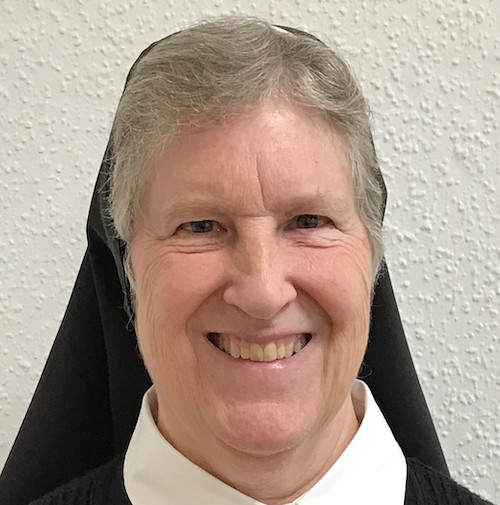 Mary Joseph Schultz of the U.S. state of New Jersey is a member of the Sisters of Christian Charity. For many years, she taught theology in high schools before becoming president of Assumption College for Sisters in Mendham, New Jersey. During the Vatican apostolic visitation in 2010, she was chosen as one of the apostolic visitators of U.S. women religious. She went on to serve as campus minister for two colleges in New Jersey, as a member of her provincial leadership team, and later worked as parish pastoral associate. She is presently serving as first councilor and vicaress at the Sisters of Christian Charity generalate in Germany.
Mary Joseph Schultz of the U.S. state of New Jersey is a member of the Sisters of Christian Charity. For many years, she taught theology in high schools before becoming president of Assumption College for Sisters in Mendham, New Jersey. During the Vatican apostolic visitation in 2010, she was chosen as one of the apostolic visitators of U.S. women religious. She went on to serve as campus minister for two colleges in New Jersey, as a member of her provincial leadership team, and later worked as parish pastoral associate. She is presently serving as first councilor and vicaress at the Sisters of Christian Charity generalate in Germany.
To me, the season of Advent is wonder-full: full of hope, joy and anticipation. A new liturgical year opens with promise and the opportunity to refocus on what truly matters. Over the years (amid societal pressures), I have tried to be more watchful and more silent during Advent, keeping my gaze on Mary. This year, concerts and Christmas markets here in Germany are banned. Perhaps it will be easier to be silent this year with fewer gatherings permitted. Let Christmas celebrations happen later, in their own time. This is Advent!
Silence must have played a large part in Mary's life, but most especially at the beginning of her pregnancy. How to take in and make sense of all that the angel Gabriel told her? Human rationalizing could not explain, especially to Joseph. Pondering, mulling, praying, trusting, she set out immediately on a mission of service to Elizabeth. I picture Mary and Elizabeth sitting in silence some days, weaving baby clothes in preparation for their newborns. Words were unnecessary.
Mary was probably present when Zechariah first opened his mouth after being mute for many months. He opened his mouth in praise, joy and blessing of God. He was silent and watchful for nine months as mystery unfolded around him. Mary was silent and watchful as mystery grew within her.
As we begin Advent, we prepare also to close out a year of confusion, tension, loss, pain and frustration. In these last few weeks, let us be silent, mindful and watchful, not missing the opportunity. Let us ponder the lessons we have learned. Only in stillness can we embrace and begin to make sense of the workings of God. The mystery of Jesus coming to birth within each of us calls us to silent wonder.
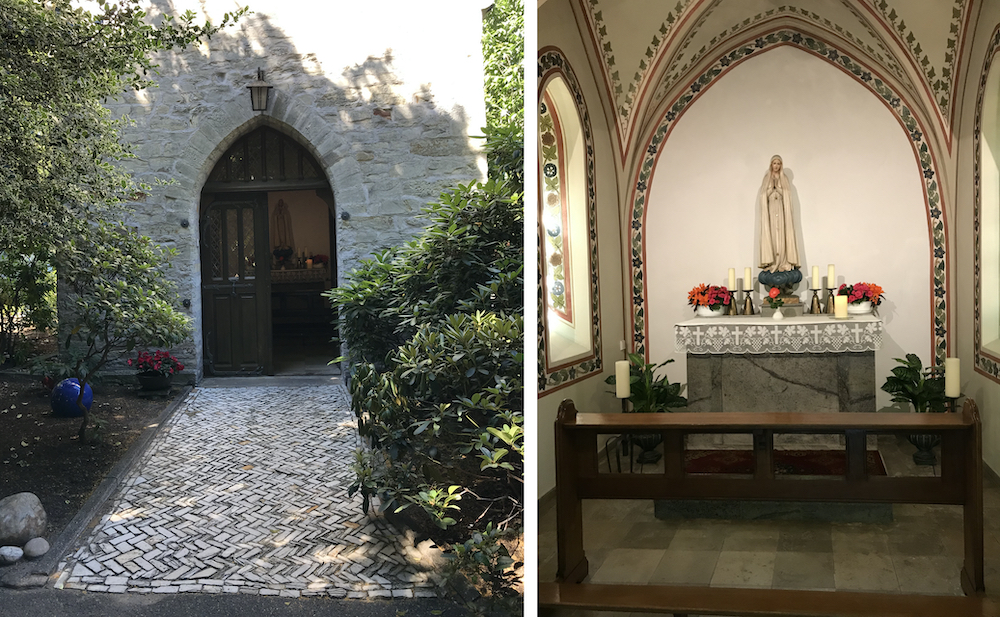
The Fatima Chapel on the motherhouse property of the Sisters of Christian Charity in Germany is a quiet little oasis for stillness where many come to pray. Sr. Mary Joseph Schultz: "Silence must have played a large part in Mary's life, but most especially at the beginning of her pregnancy. How to take in and make sense of all that the angel Gabriel told her?" (Provided photos)
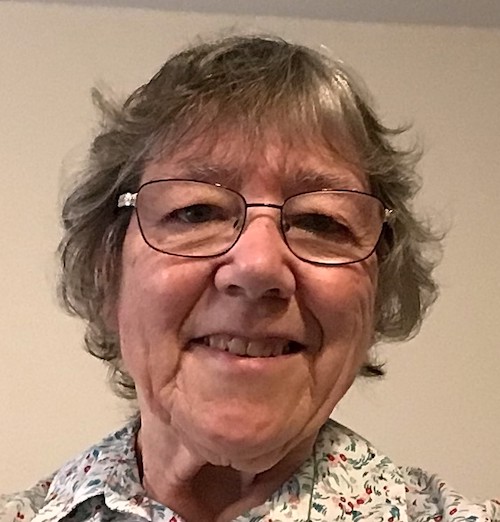 Kathryn Keigher is from England, a member of the Institute of the Blessed Virgin Mary (Loreto Sisters). Most of her ministry was spent teaching English and religious education in secondary school and college, but she taught English in Romania over the holidays. She also served at a Loreto mission in Bolivia for four years. She is the justice, peace and integrity of creation coordinator for her region and schools and worked for several months at the congregation's nongovernmental organization office in New York. She does volunteer work teaching English as a second language.
Kathryn Keigher is from England, a member of the Institute of the Blessed Virgin Mary (Loreto Sisters). Most of her ministry was spent teaching English and religious education in secondary school and college, but she taught English in Romania over the holidays. She also served at a Loreto mission in Bolivia for four years. She is the justice, peace and integrity of creation coordinator for her region and schools and worked for several months at the congregation's nongovernmental organization office in New York. She does volunteer work teaching English as a second language.
Mary Ward, the Yorkshire woman who founded the Institute of the Blessed Virgin Mary in 1609, encouraged her followers to serve God by doing ordinary things well. Could we have ever imagined that one day, doing ordinary things well would become a matter of life and death?
The arrival of COVID-19 challenged the world not to take ordinary things for granted. In the midst of this new world, deaths soared while we in the United Kingdom praised our National Health Service — and heroes emerged.
Marcus Rashford on England's football team plays against Belgium at the 2018 FIFA World Cup, June 28, 2018. (Wikimedia Commons/Soccer.ru/Kirill Venediktov)
Among these heroes was a relatively unknown young man called Marcus Rashford. He does ordinary things well. He kicks a football. Suddenly, in the darkness of death and fear of the unknown, there was light. Everyone was talking about the young footballer who grew up in poverty in Manchester and recently challenged the prime minister to reverse a ruling that free meals would not be available for the poorest and most vulnerable children when schools were closed during the holidays. Marcus won his case, galvanizing the country into a new campaign to end child poverty in a country that is considered "wealthy."
And the ordinary light created other ordinary lights because it is not only pandemics that are infectious: goodness, empathy, compassion and generosity have become more apparent and more celebrated.
As we move toward Advent and the great Christian feast of light, we are still fearful that we will be unable to celebrate the "ordinary" conventual rituals of Christmas. We remind ourselves that the feast of Christmas, especially in 2020, is about discovering light in darkness:
He will bring new light to a world in darkness
like a bright star shining in the skies above.
He will bring new hope to the waiting nations.
When he comes to reign in purity and love.
— "Angels' Carol" by John Rutter
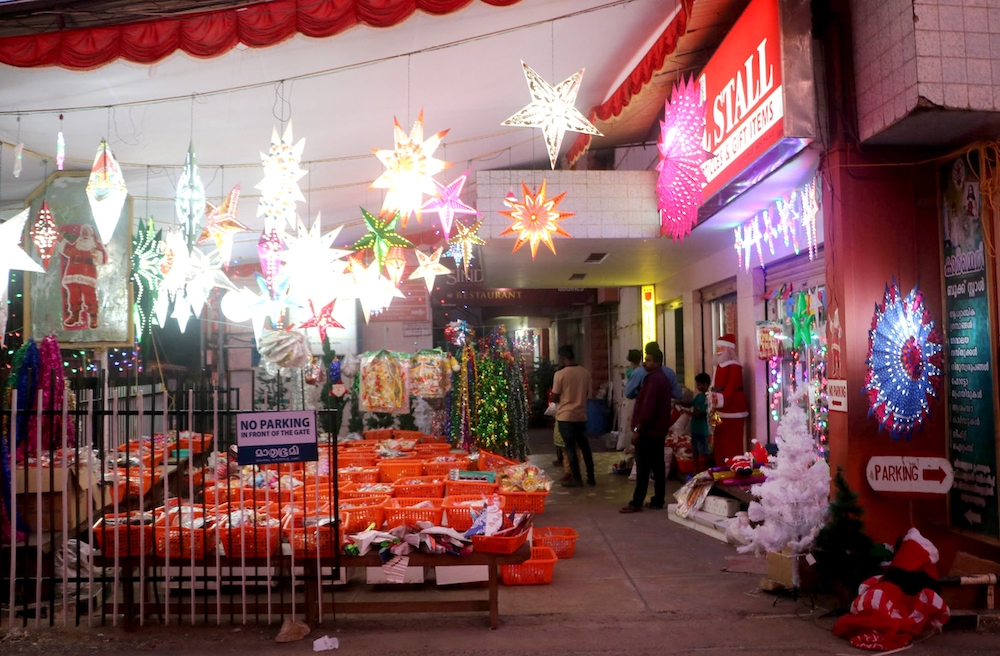
Deserted Christmas stalls are seen in Thiruvananthapuram, India, Dec. 11, 2016. (CNS/Anto Akkara)
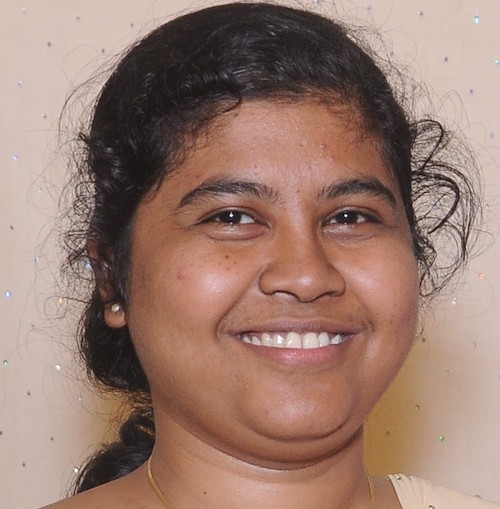 Robancy A. Helen is from Tamil Nadu, South India, and is a member of the Idente Missionaries (Religious Institute of Christ the Redeemer). With an academic background in English, social work and theology, she has written about and worked in women's issues. Recently, she served for five years as the program coordinator in the Catholic Bishops' Conference of India's Office for Scheduled Castes/Backward Classes. She is currently working on doctoral studies and training Catholic youth in leadership and social issues.
Robancy A. Helen is from Tamil Nadu, South India, and is a member of the Idente Missionaries (Religious Institute of Christ the Redeemer). With an academic background in English, social work and theology, she has written about and worked in women's issues. Recently, she served for five years as the program coordinator in the Catholic Bishops' Conference of India's Office for Scheduled Castes/Backward Classes. She is currently working on doctoral studies and training Catholic youth in leadership and social issues.
Christmas is a season for sharing love and happiness. God shared his love for humanity; Jesus shared his divinity; Mother Mary shared her happiness with her cousin Elizabeth. The angels shared the good news with the shepherds.
In our lives, too, Christmas means sharing. Following my memory lane back to my childhood: Christmas is sharing some of my pocket money, sharing talents through dance or drama, or sharing gifts. When I was at school, we used to visit an orphanage or old age home to spend some time with the needy during Christmas.
Every year, we anticipated that day of visiting those children who expected us to share our time with them — having lunch and playing with them. The happiness expressed in the eyes of those kids was my Christmas present from Santa Claus. God gave me all I wanted, and he wanted me to give to those who are in need.
So, it was a "fun-filling" moment when we spent our time with those who had less than we did. In sharing, I found love and joy in my heart and through the eyes of the other person. This made me believe Jesus came to us to share the love of God. We were taught that Jesus shared his own life so we might all be redeemed.
Today, the COVID-19 pandemic challenges us to share things with the needy. Some churches still provide midday meals and rations to the poor so we can experience the joy of Christmas in sharing what we have with our neighbors. Let our sharing also be love, forgiveness, unity, care and concern.
Jesus shared everything with others. Self-emptying makes it possible for us to enjoy the heavenly bliss of the shepherds in Bethlehem.
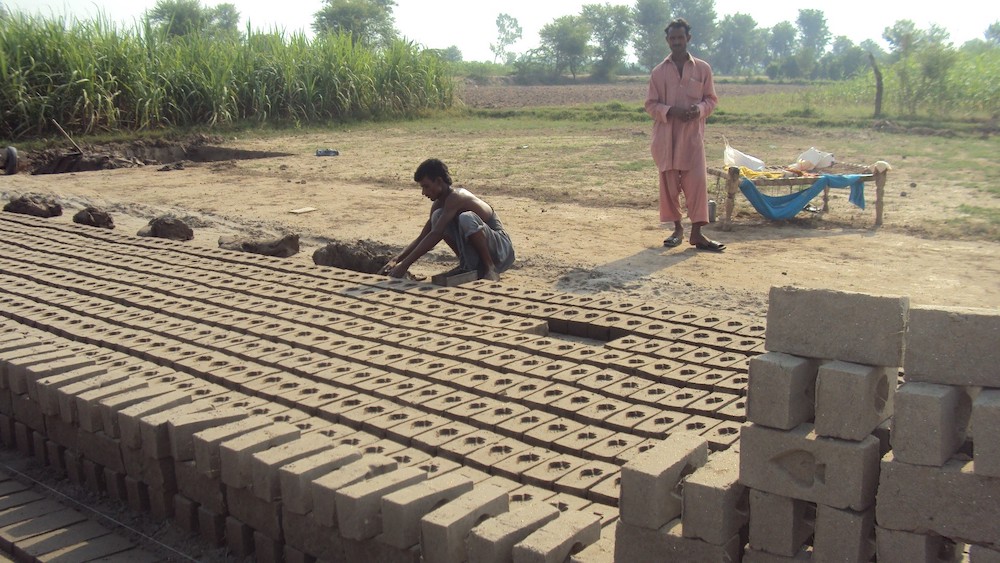
Jasmine's father makes bricks by hand in Pakistan to support his family. (Provided photo)
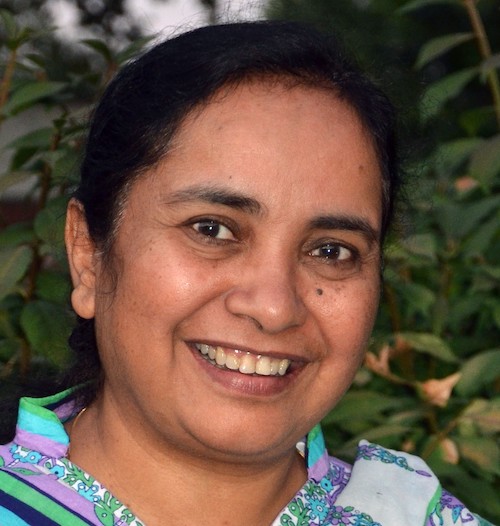 Nasreen Daniel is a member of the U.S. Sisters of Loretto. From Lahore, Pakistan, she obtained paralegal training and a master's degree in English in Pakistan. Further studies in India and the Netherlands included international law and theology, social studies, counseling and religious studies. She taught in seminaries in Pakistan and in academies in the United States and was a field worker and journalist for the Society for the Protection of the Rights of the Child, a Muslim/Christian consortium. She has published in English, Urdu and Dutch. Since 2016, she has been the chairperson for Major Superiors Leadership Conference of Pakistan.
Nasreen Daniel is a member of the U.S. Sisters of Loretto. From Lahore, Pakistan, she obtained paralegal training and a master's degree in English in Pakistan. Further studies in India and the Netherlands included international law and theology, social studies, counseling and religious studies. She taught in seminaries in Pakistan and in academies in the United States and was a field worker and journalist for the Society for the Protection of the Rights of the Child, a Muslim/Christian consortium. She has published in English, Urdu and Dutch. Since 2016, she has been the chairperson for Major Superiors Leadership Conference of Pakistan.
Growing up in a Muslim country like Pakistan, I know Christmas in a remote village brings two things: new clothes and a festive dinner. That is to say, for those who could afford these.
But for little Jasmine, it brings sadness and deprivation. Her father works in a brick kiln. He owes a huge amount of money to the landlord. Her family wanted boys, but they have five daughters.
The mother sent two daughters to stay with her mother, since they could not feed all five of them. Jasmine is the eldest daughter, so she and a younger sister went to live with the grandmother. The grandmother came to our school and shared the whole story with us.
Jasmine is very inquisitive, and she comes to me often with many questions. A few days ago, I just happened to ask her what she would like to have for Christmas. She looked at me with a peculiar expression, as though I had asked her something very strange. She said in her village, they cook meat that day and sometimes have new clothes. My question seemed strange to her because no one has ever asked her what she would want to have for Christmas.
My own wish for this Christmas is that St. Nicholas will lose his way, his ship hit the Arabian Sea, and his reindeer find their way to the most remote villages in Pakistan to bring a smile to the sad faces. That all the gift-filled stockings fly all over the world and land in the hands of those kids who have never seen or owned a toy. I wish that all the elves would learn to bake a mouth- watering cake for the children who have never known the taste of a Christmas cake. I wish that the birth of Jesus gives birth to joy, hope and peace where it is most needed.







